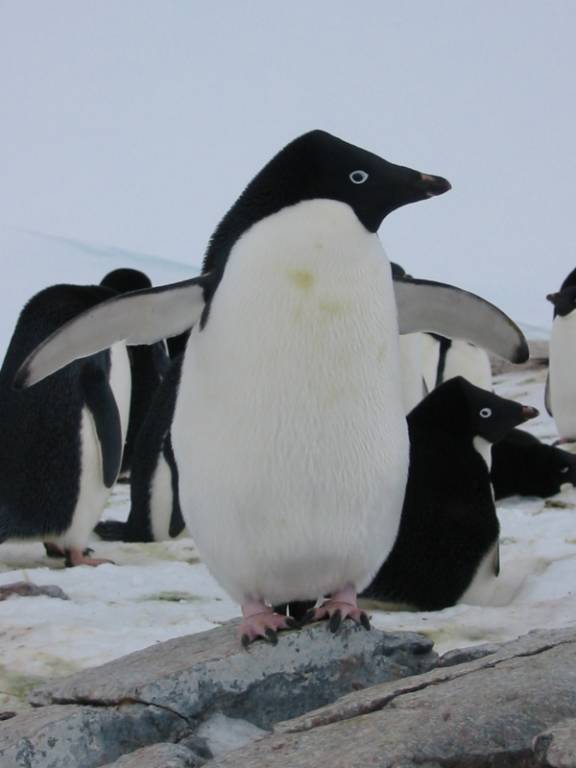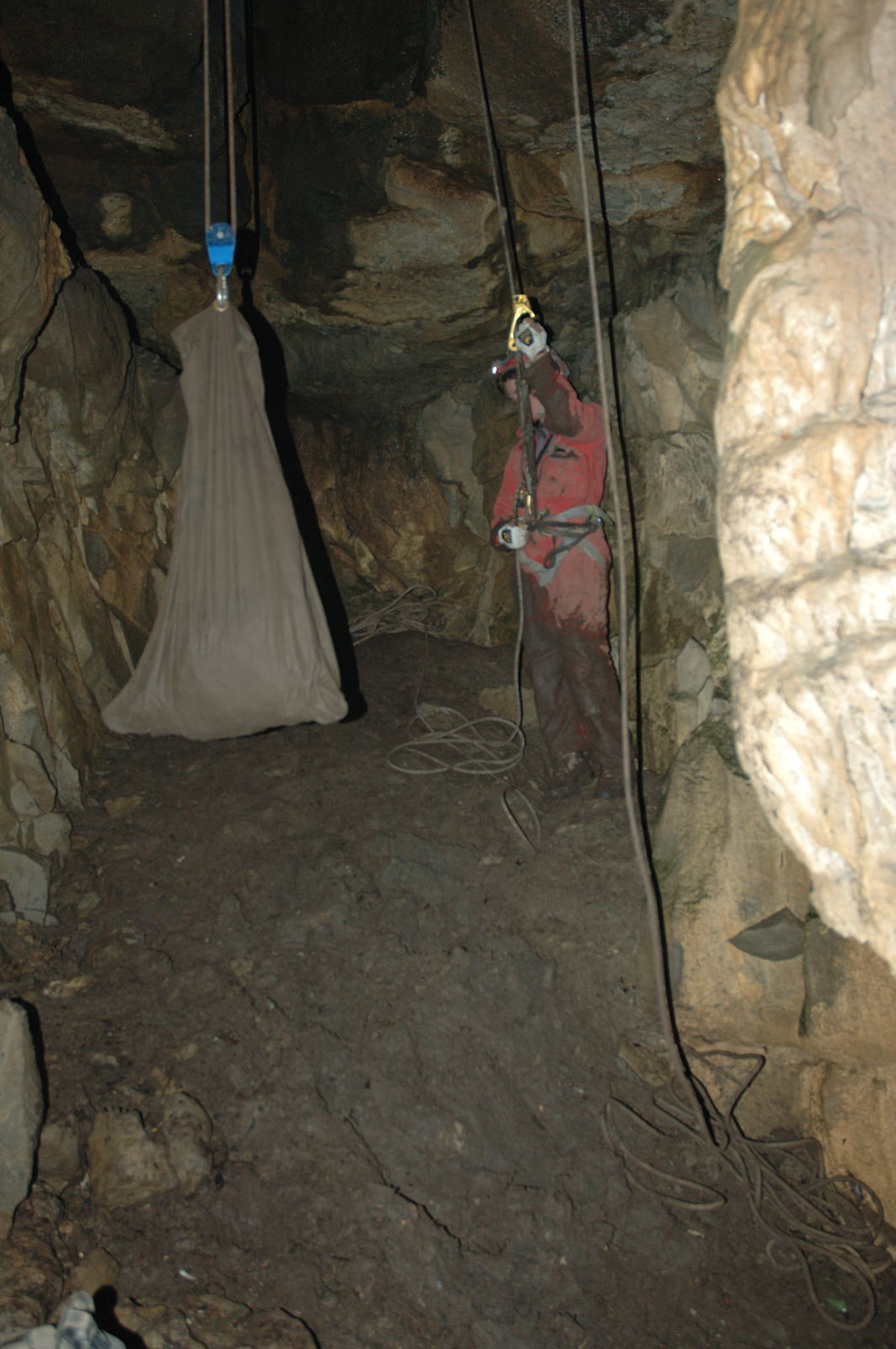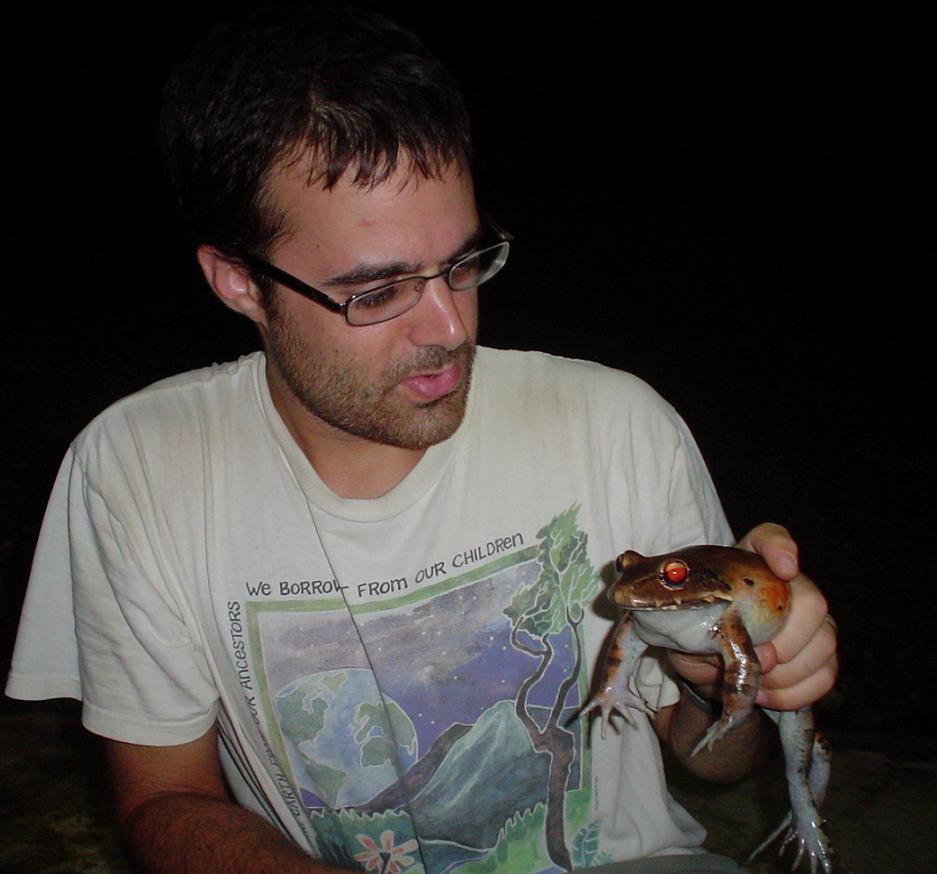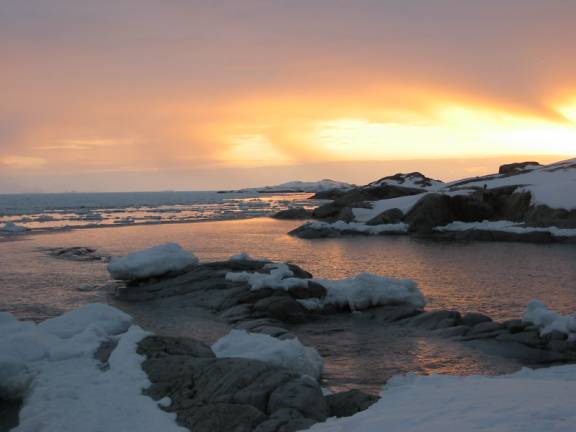Selected Lab Publications
Arranged by Topic:
- Spatial Ecology and Animal Movement
- Theoretical Ecology
- Biodiversity Databases and Ecological Informatics
- Quantitative Conservation Biology
- Linking Biological Stoichiometry, Evolution, and Community Ecology
- Generalist Predators
Copyright Notice: This material is presented to ensure timely dissemination of scholarly and technical work. Copyright and all rights therein are retained by authors or by other copyright holders. All persons copying this information are expected to adhere to the terms and constraints invoked by each author's copyright. In most cases, these works may not be reposted without the explicit permission of the copyright holder.
Spatial Ecology and Animal Movement
- Mueller, T, R O'Hara, R Urbanek, S Converse, and WF Fagan. 2013. Social learning and migratory performance. Science. 341: 999-1002. (Cover Article)
- Fleming, C.H., J.M. Calabrese, T. Mueller, K.A. Olson, P. Leimgruber, and W.F. Fagan. 2014. From fine-scale foraging to home ranges: A semi-variance approach to identifying movement modes across spatiotemporal scales. American Naturalist. E154-E167.
- Fagan, WF, M A Lewis, M Auger-Méthé, T Avgar, S Benhamou, G Breed, L LaDage, U Schlägel, W Tang, Y Papastamatiou, J Forester, and T Mueller. Spatial memory and animal movement. Ecology Letters. 16: 1316-1329.
- Lynch, HJ, M Rhainds, JM Calabrese, S Cantrell, C Cosner, and WF Fagan. 2013. How climate extremes-not means-define a species' geographic range boundary via a demographic tipping point. Ecological Monographs. 84: 134-149.
- Kavathekar, D, T Mueller, and WF Fagan. 2013. Introducing AMV (Animal Movement Visualizer), A visualization tool for animal movement data from satellite collars and radiotelemetry. Ecological Informatics. 15: 91-95.
- Berbert, JM, and WF Fagan. 2012. How the interplay between individual spatial memory and landscape persistence can generate population distribution patterns. Ecological Complexity. 12: 1-12.
- Martinson, HM, WF Fagan, and RF Denno. 2012. Food web structure depends on patch size in an arthropod food web. Ecology. 93: 1779-1786.
- Grant, EHC, Lynch, HJ, R Muneepeerakul, I Rodriguez-Iturbe, and WF Fagan. 2012. Interbasin water transfer, riverine connectivity, and spatial controls on fish biodiversity. PlosONE. 7: e34170.
- Zipkin, E, EHC Grant, and WF Fagan. 2012. Developing and testing a community modeling approach for predicting species occurrences given uncertainty. Ecological Applications. 22: 1962-1972.
- Lynch, HJ, R Naveen, PN Trathan, and WF Fagan. 2012. Environmental change and the shifting balance among penguins on the Antarctic Peninsula. Ecology. 93: 1367-1377.
- Kennedy, C., E. Grant, M. Neel, W. Fagan, and P. Marra. 2011. Landscape matrix mediates occupancy dynamics of Neotropical avian insectivores. Ecological Applications 21(5): 1837-1850. abstract
- Lynch, H.J., E.H.C. Grant, R. Muneepeerakul, I. Rodriguez-Iturbe, and W.F. Fagan. 2011. How restructuring river connectivity changes freshwater biodiversity and biogeography. Water Resources Research 47, W05531, doi:10.1029/2010WR010330. abstract
- Marleau, J.N., Y. Jin, J.G. Bishop, W.F. Fagan, and M.A. Lewis. 2011. A stoichiometric model of early plant primary succession. American Naturalist 177: 233-245. abstract
- Zeigler, SL, MC Neel, L Oliviera, BE Raboy, WF Fagan. 2011. Conspecific and heterospecific attraction in assessments of functional connectivity. Biodiversity and Conservation DOI: 10.1007/s10531-011-0107-z. abstract
- Fagan, W.F., C. Cosner, E.A. Larsen and J.M. Calabrese. 2010. Reproductive asynchrony in spatial population models: How mating behavior can modulate Allee effects arising from isolation in both space and time. American Naturalist 175: 362-373.
 PDF / abstract
PDF / abstract - Goldberg, E.E., H.J. Lynch, M.G. Neubert and W.F. Fagan. 2010. Effects of branching spatial structure and life history on the asymptotic growth rate of a population. Theoretical Ecology 3:137-152.
 PDF / abstract
PDF / abstract - Grant, E.H.C., J.D. Nichols, W.H. Lowe and W.F. Fagan. 2010. Use of multiple dispersal pathways facilitates amphibian persistence in stream networks. Proceedings of the National Academy of Sciences. doi: 10.1073/pnas.1000266107.
 PDF / abstract
PDF / abstract - Kennedy, C., P. Marra, W. Fagan, and M. Neel. 2010. Landscape matrix and species traits mediate responses of Neotropical resident birds to forest fragmentation in Jamaica. Ecological Monographs 80:651-669.
 PDF / abstract
PDF / abstract - Fagan, W.F., R.S. Cantrell, C. Cosner, and S. Ramakrishnan. 2009. Interspecific Variation in Critical Patch Size and Gap-Crossing Ability as Determinants of Geographic Range Size Distributions. American Naturalist 173: 363-375. article / abstract
- Mueller, T. and W.F. Fagan. 2008. Search and navigation in dynamic environments - from individual behaviors to population distributions. Oikos 117: 654-664.
 PDF / abstract
PDF / abstract - Muneepeerakul, R., E. Bertuzzo, H.J. Lynch, W.F. Fagan, A. Rinaldo and I. Rodriguez-Iturbe. 2008. Neutral metacommunity models predict fish diversity patterns in Mississippi-Missouri basin. Nature 453: 220-222.
abstract
- Fagan, W.F., F. Lutscher, and K. Schneider. 2007. Population and community consequences of spatial subsidies derived from central place foraging. American Naturalist 170(6): 902-915.
 PDF / abstract
PDF / abstract - Grant, E.H.C., Winsor H. Lowe, and William F. Fagan. 2007. Living in the branches: population dynamics and ecological processes in dendritic networks. Ecology Letters 10:165-175.
 PDF / abstract
PDF / abstract - Aumann, C., L. Eby, and W.F. Fagan. 2006. How transient patches affect population dynamics: the case of hypoxia and blue crabs. Ecological Monographs. 76 : 415-438 (plus 109 pages of online enhancements [that's right, 109 pages]).
 PDF / abstract
PDF / abstract - Fagan, W.F. , M.A. Lewis, M. Neubert, C. Aumann, J. Apple, and J.G. Bishop. 2005. When can herbivores reverse the spread of an invading plant ? A test case from Mount St. Helens. American Naturalist . 166 : 669-686 (plus 8 pages of online enhancements)
 PDF / abstract
PDF / abstract - Cantrell, S., C. Cosner, and W.F. Fagan. 2005. Edge-linked dynamics and the scale-dependence of competitive dominance. Mathematical Biosciences and Engineering 2 : 833- 868.
 PDF / abstract
PDF / abstract - Calabrese, J.M. and W.F. Fagan. 2004. A comparison shoppers' guide to connectivity metrics: trading off between data requirements and information content. Frontiers in Ecology and the Environment. 2:529-536.
 PDF / abstract
PDF / abstract - Fagan, W.F., M.-J. Fortin, and C. Soykan. 2003. Integrating edge detection and dynamic modeling in quantitative analyses of ecological boundaries. Bioscience 53: 730-738.
 PDF / abstract
PDF / abstract - Fagan, W.F., M.A. Lewis, M.G. Neubert, and P. van den Driessche. 2002. Invasion theory and biological control. Ecology Letters 5: 148-157.
 PDF / abstract
PDF / abstract - Fagan, W.F. 2002. Connectivity, fragmentation, and extinction risk in dendritic metapopulations. Ecology 83: 3243-3249.
 PDF / abstract
PDF / abstract - Fagan, W.F., and J.G. Bishop. 2000. Trophic interactions during primary succession: Herbivores slow a plant reinvasion at Mount St. Helens. American Naturalist 155: 238-251.
 PDF / abstract
PDF / abstract - Fagan, W.F., R.S. Cantrell, and C. Cosner. 1999. How habitat edges change species interactions. American Naturalist 153: 165-182.
 PDF / abstract
PDF / abstract
Theoretical Ecology
- Fagan, WF, RS Cantrell, C Cosner, A Noble, and T Mueller. 2012. Leadership, social learning, and the maintenance (or collapse) of migratory populations. Theoretical Ecology. 5: 253-264.
- Fagan, WF, MA Lewis, M Auger-Méthé, T Avgar, S Benhamou, G Breed, L LaDage, U Schlägel, W Tang, Y Papastamatiou, J Forester, and T Mueller. Spatial memory and animal movement. Ecology Letters. In press.
- Berbert, JM, and WF Fagan. 2012. How the interplay between individual spatial memory and landscape persistence can generate population distribution patterns. Ecological Complexity. 12: 1-12.
- Noble, A., A. Hastings, and W.F. Fagan. In press. A multivariate Moran process with Lotka-Volterra phenomenology. Physical Review Letters. 23: 239904
- Fagan, W.F., R.S. Cantrell, C. Cosner, T. Mueller, and A. Noble. 2011. Leadership, social learning, and the maintenance (or collapse) of migratory populations. Theoretical Ecology DOI: 10.1007/s12080-011-0124-2.
- Mueller T., W.F. Fagan, and V. Grimm. 2011. Integrating individual search and navigation behaviors in mechanistic movement models. Theoretical Ecology 4: 341-355.
- Noble, A.E., N.M. Temme, W.F. Fagan, and T.H. Keitt. 2011. A sampling theory for asymmetric communities. Journal of Theoretical Biology 273: 1-14. abstract
- Goldberg, E.E., H.J. Lynch, M.G. Neubert and W.F. Fagan. 2010. Effects of branching spatial structure and life history on the asymptotic growth rate of a population. Theoretical Ecology 3:137-152.
 PDF / abstract
PDF / abstract
Biodiversity Databases and Ecological Informatics
- Mueller, T., G. Dressler, C. Tucker, J. Pinzon, P. Leimgruber, R. Dubayah, G. Hurtt, K. Böhning-Gaese, and W. F. Fagan. 2014. Direct anthropogenic effects on long-term global trends in photosynthetic capacity. Remote Sensing. 6: 5717-5731.
- Mueller,, T, R O'Hara, R Urbanek, S Converse, and WF Fagan. 2013. Social learning and migratory performance. Science. In press. (Cover Article)
- Fagan, WF, Y Pearson, E Larsen, JB Turner, HJ Lynch, H Staver, J Turner, AE Noble, S Bewick, and E Goldberg. 2013. Phylogenetic prediction of the maximum per capita rate of population growth. Proceedings of the Royal Society, Series B. 280: 20130523
- Mueller, T., K.A. Olson, G. Dressler, P. Leimgruber, T.K. Fuller, C. Nicolson, A.J. Novaro, M.J. Bolgeri, D. Wattles, S. DeStefano, J.M. Calabrese, and W.F. Fagan. How landscape dynamics link individual movements to population-level patterns: a multispecies comparison of ungulate relocation data. Global Ecology and Biogeography. 20: 683-694.
- Muneepeerakul, R., E. Bertuzzo, H.J. Lynch, W.F. Fagan, A. Rinaldo and I. Rodriguez-Iturbe. 2008. Neutral metacommunity models predict fish diversity patterns in Mississippi-Missouri basin. Nature 453: 220-222. article /
abstract
- Sheller, F.J., W.F. Fagan , and P.J. Unmack. 2006. Analyzing translocation success from sporadic monitoring data using survival analysis: Lessons from the Gila topminnow ( Poeciliopsis occidentalis ). Ecological Applications 16(5): 1771-1784.
 PDF / abstract
PDF / abstract - Fagan, W.F., C. Aumann, C.M. Kennedy, and P.J. Unmack. 2005. Rarity, fragmentation, and the scale dependence of extinction risk in desert fishes. Ecology 86 : 34-41. abstract
- Fagan, W.F., P.J. Unmack, C. Burgess, and W.L. Minckley. 2002. Rarity, fragmentation, and extinction risk in desert fishes. Ecology 83 : 3250-3256. abstract
- Fagan, W.F., E. Meir, J. Prendergast, A. Folarin, and P. Kareiva. 2001. Characterizing population vulnerability for 758 species. Ecology Letters 4 : 132-138.
 PDF / abstract
PDF / abstract - Boersma, P.D., P.M. Kareiva, W.F. Fagan, and J.A. Clark. 2001. How good are endangered species recovery plans? Bioscience 51 : 643-649.
 PDF.
PDF. - Andelman, S.J., and W.F. Fagan. 2000. Umbrellas and flagships: Efficient conservation surrogates or expensive mistakes? Proceedings of the National Academy of Sciences USA 97 : 5954-5959.
 PDF / abstract
PDF / abstract
Quantitative Conservation Biology
- Mueller,, T, R O'Hara, R Urbanek, S Converse, and W F Fagan. 2013. Social learning and migratory performance. Science. In press. (Cover Article)
- Fagan, WF, Y Pearson, E Larsen, JB Turner, HJ Lynch, H Staver, J Turner, A E Noble, S Bewick, and E Goldberg. 2013. Phylogenetic prediction of the maximum per capita rate of population growth. Proceedings of the Royal Society, Series B. 280: 20130523
- Zeigler, S, L Oliveira, B Raboy, M Neel, and WF Fagan. 2012. Conspecific and heterospecific attraction in the assessment of functional connectivity patterns between forest patches for a social primate in Brazil. Biodiversity and Conservation. 20: 2779-2796.
- Fagan, WF, RS Cantrell, C Cosner, A Noble, and T Mueller. 2012. Leadership, social learning, and the maintenance (or collapse) of migratory populations. Theoretical Ecology. 5: 253-264.
- Lynch, HJ, EHC Grant, R Muneepeerakul, I Rodrigue-Iturbe, and W F Fagan. 2011. How restructuring river connectivity changes freshwater biodiversity and biogeography. Water Resources Research. 47: W05531.
- Grant, E.H.C., J.D. Nichols, W.H. Lowe and W.F. Fagan. 2010. Use of multiple dispersal pathways facilitates amphibian persistence in stream networks. Proceedings of the National Academy of Sciences - USA. 107: 6936-6940. doi: 10.1073/pnas.1000266107.
 PDF / abstract
PDF / abstract - Lynch, H.J., S. Zeigler, L. Wells, J. D. Ballou, and W.F. Fagan. 2010. Patterns of survivorship in captive mammalian populations and their implications for estimating population growth rates in data-poor situations. Ecological Applications. 20: 2334-2345.
- Kennedy, C., P. Marra, W. Fagan, and M. Neel. 2010. Landscape matrix and species traits mediate responses of Neotropical resident birds to forest fragmentation in Jamaica. Ecological Monographs 80:651-669.
 PDF / abstract
PDF / abstract - Holmes, E.E., J. Sabo, S. Viscido, and W.F. Fagan. 2007. Statistical rather than mechanistic approaches to extinction risk forecasting. Ecology Letters. 10: 1182-1198.
- Lynch, H.J. and W.F. Fagan. 2009. Survivorship curves and their impact on the estimation of maximum population growth rates. Ecology 90: 1116-1124.
 PDF / abstract
PDF / abstract - Calabrese, J.M., L. Ries, S.F. Matter, D.M. Debinski, J.N. Auckland, J. Roland and W.F. Fagan. 2008. Reproductive asynchrony in natural butterfly populations and its consequences for female matelessness. Journal of Animal Ecology 77: 746-756.
 PDF / abstract
PDF / abstract - Fagan, W.F., and F. Lutscher. 2006. The average dispersal success approximation: Linking home range size, natal dispersal, and metapopulation dynamics to reserve design. Ecological Applications. 16 : 820-828.
 PDF / abstract
PDF / abstract - Fagan, W.F. , and E. E. Holmes. 2006. Quantifying the extinction vortex. Ecology Letters . 9 : 51-60.
 PDF / abstract
PDF / abstract - Fagan, W.F., C.M. Kennedy, and P.J. Unmack. 2005. Quantifying rarity, losses, and risks for lower Colorado River Basin fishes: Implications for conservation listing. Conservation Biology. 19 : 1872-1882.
 PDF / abstract
PDF / abstract - Calabrese, J.M. and W.F. Fagan. 2004. Lost in time, lonely and single: Reproductive asynchrony and the Allee effect. American Naturalist. 164 : 25-37.
 PDF / abstract
PDF / abstract - Holmes, E.E., and W.F. Fagan. 2002. Validating population viability analysis for corrupted data sets. Ecology 83 : 2379-2385. abstract
Linking Biological Stoichiometry, Evolution, and Community Ecology
- Gilbert, J, H Martinson, C Acquisti, J J Elser, S Kumar, and W F Fagan. 2013. GRASP [Genomic Resource Access for Stoichioproteomics]: Comparative explorations of the atomic content of 12 Drosophila proteomes. BMC Genomics. 14:599.
- Gilbert, J. and W.F. Fagan. 2011. Contrasting mechanisms of proteomic nitrogen thrift in two ecotypes of Prochlorococcus. Molecular Ecology. 20: 92-104.
- Elser, J.J., W.F. Fagan, A.J. Kerkhoff, N.G. Swenson, and B.J. Enquist. 2010. Biological stoichiometry of plant production: metabolism, scaling, and ecological response to global change. New Phytologist. 186: 593-608 (Invited Tansley Review)
- Hambäck, P.A., J. Gilbert, K. Schneider, H.M. Martinson, G. Kolb, and W.F. Fagan. 2009. Effects of body size, trophic mode and larval habitat on dipteran stoichiometry: A regional comparison. Oikos 118: 615-623.
 PDF / abstract
PDF / abstract - Martinson, H. M.^, K. Schneider^, J. Gilbert, J.E. Hines, P.A. Hambäck, and W. F. Fagan. 2008. Detritivory: stoichiometry of a neglected trophic level. Ecological Research 23: 487-491. [^: Equal contribution] abstract
- Fagan, W.F., F. Lutscher, and K. Schneider. 2007. Population and community consequences of spatial subsidies derived from central place foraging. American Naturalist 170(6): 902-915.
 PDF / abstract
PDF / abstract - Elser, J.J., W.F. Fagan, S. Subramanian, and S. Kumar. 2006. Signatures of ecological resource availability in the animal and plant proteomes. Molecular Biology and Evolution 23: 1946 - 1951.
 PDF / abstract
PDF / abstract - Kerkhoff, A.J., W.F. Fagan , J.J. Elser, and B. J. Enquist. 2006. Phylogenetic and growth form variation in the scaling of nitrogen and phosphorus in the seed plants. American Naturalist. 168 (4): E103-E122.
 PDF / abstract
PDF / abstract - Denno, R.F., and W.F. Fagan. 2003. Might nitrogen limitation promote omnivory among carnivorous arthropods? Ecology 84 : 2522-2531.
 PDF / abstract
PDF / abstract - Fagan, W.F., E. Siemann, C. Mitter, R.F. Denno, A.F. Huberty, H.A. Woods, and J.J. Elser. 2002. Nitrogen in insects: Implications for trophic complexity and species diversification. American Naturalist 160 : 784-802.
 PDF / abstract
PDF / abstract - Elser, J.J., W.F. Fagan, R.F. Denno, D.R. Dobberfuhl, A. Folarin, A. Huberty, S. Interlandi, S.S. Kilham, E. McCauley, K.L. Schulz, E.H. Siemann, and R.W. Sterner. 2000. Nutritional contraints in terrestrial and freshwater food webs. Nature 408 : 578-580.
 PDF / abstract
PDF / abstract
Generalist Predators (Crabs, Praying Mantids and Spiders)
- Martinson, HM, WF Fagan, and RF Denno. 2012. Food web structure depends on patch size in an arthropod food web. Ecology. 93: 1779-1786.
- Aumann, C., L. Eby, and W.F. Fagan. 2006. How transient patches affect population dynamics: the case of hypoxia and blue crabs. Ecological Monographs. 76: 415-438 (plus 109 pages of online enhancements [that's right, 109 pages]).
 PDF / abstract
PDF / abstract - Fagan, W.F. and R.F. Denno. 2004. Stoichiometry of actual versus potential predator-prey interactions: insights into nitrogen limitation for strict and intraguild predators. Ecology Letters. 7: 876-883.
 PDF / abstract
PDF / abstract - Denno, R.F., and W.F. Fagan. 2003. Might nitrogen limitation promote omnivory among carnivorous arthropods? Ecology 84: 2522-2531.
 PDF / abstract
PDF / abstract - Fagan, W.F. 2002. Can vertebrate predation alter aggregation of risk in an insect host-parasitoid system? Journal of Animal Ecology 71: 487-496.
 PDF / abstract
PDF / abstract - Fagan, W.F. 1997. Omnivory as a stabilizing feature of natural communities. American Naturalist 150: 554-568.
 PDF / abstract
PDF / abstract






